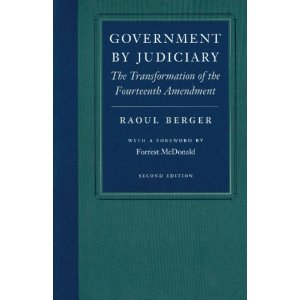Description
The Justices, who are virtually unaccountable, irremovable, and irreversible, have taken over from the people control of their own destiny.
– Raoul Berger
It is the thesis of this monumentally argued book that the United States Supreme Court—largely through abuses of the Fourteenth Amendment to the Constitution—has embarked on “a continuing revision of the Constitution, under the guise of interpretation.” Consequently, the Court has subverted America’s democratic institutions and wreaked havoc upon Americans’ social and political lives.
One of the first constitutional scholars to question the rise of judicial activism in modern times, Raoul Berger points out that “the Supreme Court is not empowered to rewrite the Constitution, that in its transformation of the Fourteenth Amendment it has demonstrably done so. Thereby the Justices, who are virtually unaccountable, irremovable, and irreversible, have taken over from the people control of their own destiny, an awesome exercise of power.”
The Court has accomplished this transformation by ignoring or actually distorting the original intent of both the framers and the supporters of the Fourteenth Amendment. In school desegregation and legislative reapportionment cases, for example, the Court manipulated the history, meaning, and purpose of the amendment’s Equal Protection Clause in order to achieve a desired political result. In cases involving First Amendment freedoms and the rights of the accused, the judges converted the Fourteenth Amendment’s Due Process Clause into a vehicle for the nationalization of the Bill of Rights. Yet these actions were nothing less than “usurpations” that robbed “from the States a power that unmistakably was left to them.”
This new second edition includes the original text of 1977 and extensive supplementary discourses in which the author assesses and rebuts the responses of his critics.
Raoul Berger retired in 1976 as Charles Warren Senior Fellow in American Legal History, Harvard University.




